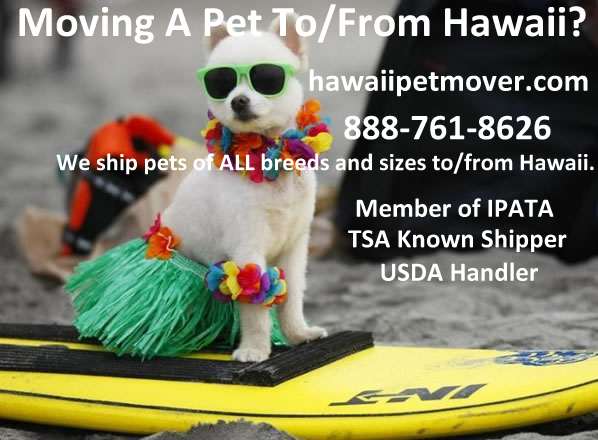Flying Your Dog to Hawaii
Traveling With Pets
Chapter 4-29 Hawaii Administrative Rules, governs the importation of dogs, cats and other carnivores into Hawaii. This law states that dogs and cats meeting specific pre- and post-arrival requirements may qualify for 5-day–or-less quarantine program, which has a provision for direct release at Honolulu International Airport after inspection.
Specific information including the 5-day-or-less quarantine program can be found at:
http://hdoa.hawaii.gov/ai/aqs/animal-quarantine-information-page/
Flying Your Dog From the Mainland to Hawaii
Alaska Airlines implemented a new dog-friendly policy in 2011 for flights to Hawaii. Please note, according to its website, “Due to strong headwinds at various times of year, Alaska Airlines limits the number of pets accepted as checked baggage on flights to or from Hawaii. This restriction does not apply to pets accepted for travel in the cabin.” See their website for more details.
Previously, Alaska Airlines’ policy did not allow dogs to fly to Hawaii.
If you choose to travel with your dog in the cabin, he will be considered your carry-on item. The fee to travel with your pet in cabin or in cargo is $100 each way.
The Alaska Airlines policy states, “Pet parents must be 18 years or older to travel with a pet in the cabin and are not allowed to occupy an emergency exit row seat. The First Class cabin can accommodate a total of one small pet per flight, and the main cabin can accommodate a total of up to five small pets per flight. A customer may travel with a maximum of two carry-on kennels/containers in the main cabin, only when the adjacent seat is purchased by the same customer.”
Effective June 18, 2018, United Airlines will implement several new policies and customer requirements for pet air transportation to improve the safety of the travel experience. Within this change, they have implemented a new pet travel policy that bans large dogs, due to the maximum height for kennels being set at 30 inches (the “700” series crates), which means most full-grown Labradors, Golden Retrievers, Huskies, Sheepdogs, etc. could not be accepted. Also affected are “snub-nosed” dogs and cats (Pug, Boxer, Persian, Himalayan) and “strong-jawed” dogs (Pit Bulls, Mastiffs, Malinois).
Be sure to check out Hawaii’s strict guidelines and quarantine requirements for traveling with your pooch. Hawaii is the only state that is currently rabies-free and wants to keep it that way. GOOD NEWS: Effective August 31, 2018, Department of Agriculture relaxed the Animal Quarantine Rules, including reducing the minimum time required: (a) from the most recently administered rabies vaccine before arrival from 90 days to 30 days; (b) from a successful OIE-RVA test before arrival in Hawaii from 120 to 30 days.
Another great resource to help ease your pup’s move to the Big Island is Keauhou Veterinary Clinic who told us, “We are more then happy to help with paperwork and such. We do inspections for Department of Agriculture at the Kona International Airport. Please let us know how we can help. As far as airlines, we prefer Alaska Airlines to all the others. They are very helpful and do a great job.”
Life Is Labs (Labrador Retriever Rescue in the state of Georgia) says, “Continental or Delta airlines do a good job. IMPORTANT**….Make SURE you work with your veterinarian to get ALL the appropriate paperwork done and pay attention to the time frames…It truly is a small novel to ship a dog to Hawaii. We’ve done it a few times for clients, and it takes a lot of time, paperwork, and follow-up.” But it’s all worth it in the end to have our fur babies with us!
Prefer to have someone else handle all the cumbersome paperwork and details of transporting your dog safely to or from Hawaii? There are several companies, including Hawaii Pet Mover (“Dog Gone Taxi” on the mainland), who handles the entire process with their expert knowledge. Hawaii Pet Mover is a member of International Pet and Animal Transportation Association (IPATA), which provides professional, competent, and caring transportation relocation services around the world. Visit their website to receive a quote or call them at 888-761-8626 for RUSH moves.
Quarantine Information
Hawaii’s quarantine program has a “5-day-or-less” option although nearly 90% of the pets traveling to Hawaii are released to their owners within a few hours of arrival (FY 2005 data).
Getting your pet directly released takes money (including your vet expenses and a $185 fee charged by Hawaii) and effort, but if you jump correctly through all the hoops, your dog will be in your hands only a few hours after your arrival in Honolulu. The Department of Agriculture’s official checklist (PDF) walks you through the required steps. Summarized briefly, they include:
Correct rabies vaccinations: Your dog has to have been vaccinated at least twice for rabies in her lifetime. The vaccines must have been administered at least 30 days apart. The most recent vaccine must have been administered more than 90 days before your dog arrives in Hawaii, but within the vaccine manufacturer’s stated booster interval (that is, your dog must still be covered by her most recent booster when she arrives in Hawaii).
Working microchip: Your dog must be microchipped, and the chip must be working properly.
OIE-FAVN rabies blood test: Your vet has to send a blood sample to an approved laboratory, which will run this test to determine whether your dog has sufficient levels of rabies vaccine in her blood. At least 120 days must pass between the day after your dog’s blood sample reaches the lab and the date of your dog’s arrival in Hawaii. (That assumes, however, that your dog’s test result is successful. If it isn’t, your dog will need to be re-vaccinated, and a new blood sample will need to be sent in. To be safe, give yourself plenty of time for this step.)
Long-acting tick treatment: “A veterinarian must treat the pet for ticks with a product containing Fipronil or an equivalent long-acting product labeled to kill ticks (Revolution® is not acceptable) within 14 days of arrival.” Frontline is an example of a product containing Fipronil (although I have personally found that Frontline Plus does not work for our dogs nor many dogs in Hawaii).
Timely delivery of supporting documents: Original documentation of both rabies vaccinations and the original of a health certificate from your vet, plus a completed Dog & Cat Import Form AQS-278 (PDF), signed by your vet and notarized, must arrive at the Rabies Quarantine Branch more than 10 days before your pet arrives in Hawaii. To save time, enclose the $165 fee (cashier’s check or money order).
Timely arrival at quarantine facility: Be sure to schedule your flight so that you arrive in Honolulu before 3:30 p.m. According to the department’s website, “it may take up to one hour for the airlines to transport a pet to the Airport Animal Quarantine Holding Facility and animals not arriving at the facility by 4:30 p.m. will not be released at the airport that day. Pets arriving in the late afternoon and evening will be held overnight until inspections are completed the following morning.”
The main thing is to get moving as soon as the idea of a Hawaii vacation (or permanent move) crosses your mind. And once you’ve jumped through these hoops, you buy yourself a period of time (since the blood test results are good for three years) during which return trips to Hawaii will be significantly easier.
Lastly, since 2007, visitors willing to jump through a couple more hoops may be allowed to request direct release of their pets from the airports on the neighboring islands of Kauai, Maui and Big Island (Kona).





